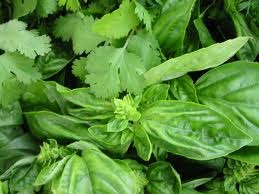I probably should have posted this before I did my first blog in this series, however I didn't and thought that this would explain somewhat to those who are "newbies" to the gardening world.
I use this as when I am giving a presentation about herbs. Hope you find it educational, enlightening, and inspiring.
According to legend, the Anglo-Latin scholar Alcuin (ca. 732-804) posed this question to his pupil Charlemagne. The King replied, “the friend of physicians and the praise of cooks.”
This
response might seem odd to early 21st century readers, but Charlemagne’s answer was
certainly indicative of his time. By the eighth century, people had been using
herbs as medical tools for over four
thousand years. Herbalism and medicine were essentially the same practice.
It is no coincidence that Native American historians point out
that at this same time, cultures in this land were also using herbs as
medicine. When the colonists befriended the natives, their "medicine
cabinets" so to say, expanded with new herbal remedies the natives brought
to them.
If you were born with diabetes, you did not live long. If an
epidemic hit, you lived and died in terror. A minor cut could lead to an
amputation. In fact, most accidents proved fatal, it was just a matter of time.
So needless to say, medicine has come a very long way since the 18th century
and prior to the 18th century. During war times, more soldiers died of disease
or infection than actually being mortally wounded in battle.
Needless
to say, modern medicine has come a long way. The diseases and infections that
we use to die from, herbs have played a major role in benefiting our lives.
We’ve learned to appreciate their qualities, ornamentally, culinary, and
medicinally. Today, about 50% of our medicines come from herbs, in some way or
form.
First and foremost, I am not a licensed herbalist, or medical practitioner, so please learn more about these herbs, and check with a health care professional before using them.







